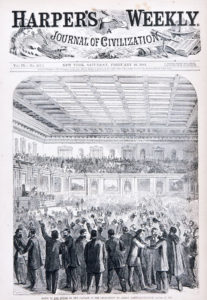
December 6: The 13th Amendment

In 1865, after over three centuries of African slavery in the Americas, the 13th Amendment officially abolished slavery in the United States. It claims that “Neither slavery nor involuntary servitude, except as a punishment for crime whereof the party shall have been duly convicted, shall exist within the United States, or any place subject to their jurisdiction.” While Abraham Lincoln’s Emancipation Proclamation made clear that the United States was committed to abolitionism, it was the 13th Amendment that ensured that chattel slavery would no longer be practiced anywhere within the nation’s borders. This was the first of three so-called Civil War Amendments; the 14th Amendment established rights of citizenship, due process and equal protection, while the 15th Amendment protected voting rights. However, today, the phrase clarifying that involuntary servitude is legal when given as a punishment to incarcerated individuals has caused debates about human rights issues in prisons. The award-winning documentary 13th argues that the 13th Amendment allowed Americans to continue racial injustice after the abolishment of slavery through mass incarceration.




